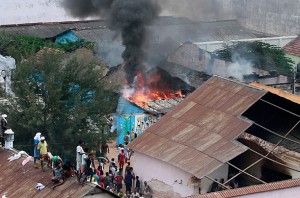Prabhat Patnaik’s opening remarks:
What framework is needed to understand land acquisition in India? In Marx’s analysis of older, pre-capitalist communities, land acquisition involved the dispossession of the primitive community and their re-absorption as individuals into the proletariat class. This transition from one form of community to another was seen as historically progressive, as the proletariat was the revolutionary class.
In pre-industrial England, there were three factors that allowed for the dispossessed to be re-absorbed into the capitalist economy (none of which are possible in present day India or China):
1. Massive waves of migration to US, Australia, etc. If the same percentage of India’s population were to migrate today, it would amount to 300 million (?) people.
2. The ability to sell goods in the colonies. In other words, England could export its unemployment to the colonies, thereby significantly increasing the position of workers in the domestic economy.
3. During the early years of industrialization, machines were made by people through labor-intensive processes. Modern technology is one of “machines making machines.”
To understand capitalism in third world societies today, it is important to emphasize the distinction between the reserve army of labor and the proletariat. Extreme poverty is concentrated in the reserve army. In contemporary India and China, as labor productivity increases, the wage rate remains the same. An underconsumption crisis is averted through an increase in consumption by the elite. If jobs are not available, peasants remain or return to the rural regions, causing increased distress on informal sector employment. It is here that we find both a consolidation of the old community and the strongest resistance to neoliberal policies. The revolutionary role of the proletariat in absent. What we need to look for then are working-class political formations that defend petty-producers, without defending existing old community structures.
Group Response and Discussion:
Last year, a few of us heard you speak on a panel at Columbia University on ‘What Does ‘Imperialism’ Mean in an Age of Global Finance?’ This set off a series of discussions within our own group on the question of imperialism—what is the relevance and use of the concept for understanding our world system today, and also the relationship between imperialism and neoliberalism. (In particular, getting away from thinking of neoliberalism merely as another word for contemporary capitalism.) In many ways, your reflections today on global economic recession and the world food crisis provide us with a very clear and important framing of the current conjuncture and an opportunity to reflect further on how we might use these two terms—neoliberalism and imperialism—to understand the capitalist system today.
A few broad themes for discussion:
1. Delinking. You argue that third world economies such as India and China to “delink from the vortex of globalized finance’?” (section IV of paper). How should we think of this as a political project?
So, for example, Lenin, describing the imperialism of his time, observed how a privileged section of labor in advanced capitalist countries were able to secure some of the surplus value appropriated from the colonies. This continued in the post-WWII period, when unionized labor in the US were the beneficiaries of US global empire. As you say, state expenditure in the form of Keynesian welfare spending, was a major exogenous stimuli for advanced capitalist economies during this period. In this historical context, the call for delinking of the Third World is also specifically a recognition of the corporatist attitude among powerful sections of the working class in advanced capitalist countries.
Of course, this privileged position of the working class in advanced capitalist states has been under assault since the advent of neoliberalism. As you say, one of the major aspects of the structural crisis today is a tendency toward “underconsumption.” One way to say this is to say that the situation for labor in advanced capitalist countries has been moving in the direction of that of labor in the third world. Because austerity measures imposed by financial interests and the freer movement of capital results, as you say, “in a significant diffusion of activities from high-wage metropolitan economies to low-wage third world countries like India and China.”
So, to return to the question, how should we understand delinking in this different conjuncture, when the situation for working classes in the center and periphery have been radically transformed. Or, to put it another way, if we want to think in terms of delinking, must our analysis not also point to the idea that advanced capitalist countries must also delink themselves from the vortex of globalized finance. And if so, what exactly is it that we are to be delinking from?
Finally, what are the limits to delinking? For example, how should we understand the current global attempt led by the US to delink Iran from the global economy?
2. Military. One form of state expenditure and exogenous spending is, of course, military spending. You identify very clearly how intensification of the current crisis leads to the emergence of fascist and semi-fascist tendencies within the third world that create divisions among people along communal lines.
In recent years, and particularly after the Mumbai attacks on 2008, India has spent a lot on beefing up military—to strengthen its role as a dominant power within the region, but also to take a position as being a frontline on the US-led “Global War on Terror.” What I’m interested in here are the kinds of linkages this entails. So, for example, India’s relationship to Israel—India accounts for 50% of Israeli defense exports, and Israel for 30% of India’s defense imports. These flows are under the full support of the US state.
So, the question is, where do we place this dynamic, of the ramp-up of military spending, as an exogenous stimulus, in relation to the deep structural contradiction of capital that you identify. Military spending in relation to GWOT is somewhat different from, for example, liberalization which allows global finance capital to come in and out of third world economies—whether its manufacturing FDI from someone like Walmart, or speculation in land values or financial assets.
Related to this is the question of Chinese and Indian land grabs in Africa. These seem to be the result of the structural contradictions identified with neoliberalism getting pushed on to other places. How should we understand these formations? As primitive accumulation? imperialism?
3. Democracy. To bring this discussion back to the question of imperialism, we might consider its relationship to democracy. Are common notions of imperialism and democracy inherently opposed to each other? Or, for example, could the rhetoric and practice of democracy be advancing imperial designs?
Patnaik’s response:
Finance capital today is quite different from Lenin’s time. Then, there was a strong link between state, finance, and industry. Today, finance capital is no longer confined to the nation-state. Instead, it makes its way around the globe in quest of speculative gains, without any links to industry. Finance capitalists no longer have an interest in seeing the world divided into blocks. Indeed, with the opening up of the world, segmentation is no longer even possible. First world labor become susceptible to third world wages (as seen in the drops in US wages, for example).
In India, there is an integration of financial elite into an international finance capitalist class. Domestic elite are no longer interested in protecting the home space. For example, they have an interest in Africa which is a kind of imperialism. However, it is an imperialism focused on control over natural resources by international capital; it is not an imperialism of which any segment of the working class could benefit.
Indo-China-Israeli pact. This is a result of our new economic formation. Previously, non-alignment was the foreign policy correlate of dirigiste. Today, we see this form of militarization as a response to the new liberalized economy. However, this is not as important as a stimulus to demand—most of this leaks out, anyway. Also, keep in mind that militarization alone is not fascism (which requires a mass movement). Militarism has to be backed by something else, like a Hindu-Muslim divide. It requires communal/racist/fascist movements as support.
Delinking. There is no real international worker movement today. Alliances must be made in the context of particular countries. If your economy is open to global financial flows, you are constrained to financial power. In Greece, financiers are demanding an austerity package. A necessary progressive strategy is to delink from these financial flows. This might allow the conditions for a political formation that is itself internationalist.
In relation to the question about Iran and the limits of delinking, it must be emphasized that delinking is only possible on a regional bases or for major economies like India and China that can cope with a separation from global flows of finance.
Finally, I would emphasize that imperialism is incompatible with real and substantive democracy. For example the IMF, World Bank, and finance capital insist on the autonomy of central banks, thereby removing from democratic accountability the most influential institution on economic polices.
— Ahmed Sharif and Neil Agarwal



